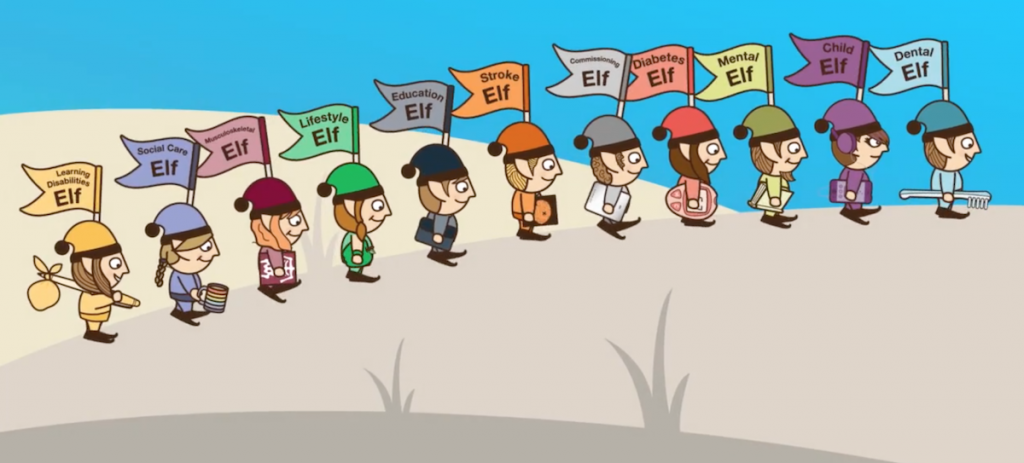
Health and social care professionals are inundated with new evidence. They can’t keep up to date, yet they are required to for professional development and audit purposes.
Our new National Elf Service tackles this problem in a unique way. Created by professionals for professionals, it summarises high quality new evidence that is relevant to practice using industry-standard appraisal criteria and an accessible and user-friendly front-end.
The service also features open and transparent discussion of the evidence, bringing together clinicians, patients and researchers. And users can track their learning as they engage with the evidence using the service’s curated content and continuing professional development tools.
No other service works in this way. Our mantra is:
- No bias
- No misinformation
- No spin
- Just what you need!
The National Elf Service aims to improve clinical practice by making it easier for professionals to engage with the best evidence.
First to be launched in the National Elf Service series is your very own Mental Elf. Carefully piloted and coproduced over the last few years, the Mental Elf helps clinical and care practitioners navigate the welter of high quality published mental health research, covering all the major conditions (such as depression and schizophrenia) and treatments (such as CBT and mindfulness).
Studies have shown each individual mental health professional would have to read around 250 research papers per day to keep up to speed with important developments in mental health treatment (Badenoch 2015). Even though the mental health sector is divided into specialist subsections, a professional still bears the burden of reading and absorbing around 20 papers per day: an overwhelming task.
This is a critical issue for professional standards and the quality of patient care. There is good evidence that the currency of clinicians’ knowledge declines over time, and that this can affect patient care (Badenoch 2011). Fortunately, there is also strong evidence that giving clinicians access to evidence-based, user-friendly summaries improves knowledge and reduces error (Ely 2005).
The Mental Elf service is made possible thanks to time and effort from the community of practising professionals. A selection of experienced practitioners has voluntarily undertaken to critically appraise the latest research, select significant developments, and then provide an evidence-based summary and clinical commentary on that research. The service then makes this work browseable by users on the Mental Elf website and across social media. The Mental Elf has over 100 expert contributors and around 45,000 regular users, all built up in its pilot phase. The service also boasts some 29,000 Twitter followers.
New membership features
In response to user research, we are now offering a number of additional services, which members can purchase through subscription, to enhance your experience of the core free service. These comprise:
- Tailored email alerts to keep you up to date with the latest reliable research
- The ability to automatically track your CPD and print certificates that summarise your learning
- Online webinars, debates and journal clubs where you can discuss the latest evidence with colleagues and experts, and refine your critical appraisal skills
- Reflective practice notes where you can keep track of your learning
- Discussion groups to help you connect with experts and colleagues in your field of interest
New elves will be joining the service soon!
Further Elf websites are currently being piloted and will be launched across 2015-16. These include:
- The Social Care Elf
- The Learning Disabilities Elf
- The Dental Elf
- The Musculoskeletal Elf
- The Commissioning Elf
- The Child Elf
- The Stroke Elf
- The Diabetes Elf
- The Lifestyle Elf
- The Education Elf

New elves will be marching into the woodland throughout 2015
It is evidently impossible for health and social care professionals in most fields to keep up to date with the torrent of high quality evidence now being published. The sheer volume of quality research is, of course, something very much to be celebrated, but if practitioners cannot absorb all of the important new knowledge, then patients do not benefit. Nor is it reasonable to demand that practitioners demonstrate continuous professional development without some way of navigating this sheer volume of research.
The clear need for a viable method of absorbing key research, and applying it to the benefit of patients, is evident from the massive interest that the Mental Elf’s pilot has attracted. It also now looks like the pilots we are running in other specialisms are showing the same enthusiastic response; most importantly from people volunteering to be contributors.
To have initiated a successful professionals community venture like this is really exciting, because it is effectively clinical and care professionals putting their hands up and saying: “This is a really good idea. Let’s all work together to make it happen.”
Subscription options
Individuals and institutions can subscribe to the new National Elf Service membership features. Please visit our registration page to find out more.
Links
Badenoch D, Tomlin A. Coping with the avalanche of evidence-based mental health research. The Mental Elf, 19 May 2015.
Badenoch D & De Brún C. (2011) Where’s the evidence for evidence? Review of abstracts of studies of clinicians’ information seeking behaviour (PDF). Newsletter of the International Society of Evidence-Based Health Care 2011;4:8-13
Ely JW, Osheroff JA, Chambliss MA et al. (2005) Answering physicians’ clinical questions: obstacles and potential solutions. JAMIA, 2005, 12(2), pp217-224.

The Mental Elf welcomes you to the National Elf Service http://t.co/ge2P0ywYgx #MentalHealth http://t.co/Hwg5Rcmx2Z
The Mental Elf welcomes you to the National Elf Service https://t.co/VJtV73FVRd via @sharethis
Love the elf
Don’t miss this launch blog from me about the new National Elf Service http://t.co/fkjkMialvh
An introduction to the national elf service http://t.co/WNxr7FZUvJ from @Mental_Elf #evidence #currentawareness
The Mental Elf welcomes you to the National Elf Service http://t.co/buT4Djps9b via @sharethis http://t.co/lu6xlafrbb
The Mental Elf welcomes you to the National Elf Service https://t.co/gfkN625keH @ECPD3 @FiMcArthur
[…] information about the benefits of this service are available on the Mental Elf website, which is the first to join the National Elf Service. The Social Care Elf will be joining […]
Looks great!